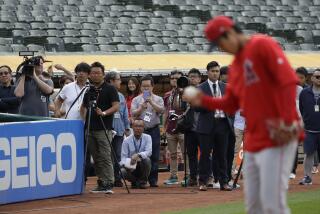Prince Naruhito’s Dates? Sorry, Press Blackout : Journalism: Cozy relationship of Japan’s media and government is illustrated by ban on news of royal chase.
TOKYO — Want to know whom the crown prince is dating these days in his dogged search for a future empress of Japan?
Unfortunately, you may not. In a show of self-restraint that Britain’s Princess Di can only dream about, Japan’s mass media have not carried a word on Prince Naruhito’s travails since March--thanks to a peculiarly Japanese institution called hodo kyotei , a news blackout agreement between the government and the media.
But as the original three-month pact between the Imperial Household Agency and 175 of Japan’s leading print and broadcast outlets on news about Naruhito’s love life threatens to extend into a year, 85 small publishers argued Wednesday that the blackout constitutes a threat to press freedom and the public’s right to know.
The publishers have formally asked the Japanese Newspaper Publishers and Editors Assn. to reject an expected entreaty by the Imperial Household Agency today to extend the blackout further.
Although the romantic exploits of the 32-year-old heir to the Chrysanthemum Throne hardly constitute news of grave public import, similar blackouts have also been imposed in such cases as Iraq’s invasion of Kuwait, the kidnaping of a corporate executive and the death of Emperor Hirohito.
The publishers say they fear that a new blackout may be imposed to restrict coverage of the Self-Defense Forces as they begin to participate in U.N. peacekeeping operations.
“This kind of news agreement is not to be found in any other democracy-advocating advanced country in the world,” said Yoshihisa Obama, chairman of the Publications Distribution Planning Council and the Japanese publisher of “The Satanic Verses.” He said that “for the mass media . . . to comply with such suppression is an act that is patently suicidal.”
The issue highlights the starkly different attitude that Japan’s mass media hold toward their public role. While the Western press tends to see itself as a public watchdog, guarding against government wrongdoing with aggressive and at times adversarial reporting, in Japan the journalistic philosophy taught at major universities is for the media to help the government guide the people.
The government-media cooperation is reflected in the Japanese system of “press clubs,” which are responsible for covering certain institutions and which offer privileged, members-only briefings and other exclusive access to official information.
(Foreign news organizations are generally barred from the clubs. After years of controversy, however, the Ministry of Foreign Affairs recently set a precedent by opening its doors.)
The cozy system, not to mention Japan’s group culture, inhibits individual reporters from breaking from the pack with enterprising pieces that challenge the Establishment, media analysts say.
“The typical Japanese journalist writes exactly what his boss wants him to write and exactly what the government wants them to write,” asserted Akira Kitagawa, president of the publishing firm Daisanshokan Co., at a news conference for foreign correspondents Wednesday.
Kitagawa added that censorship occurs in advertising as well, citing the hesitation and sometimes the refusal of newspapers to carry advertising for controversial books, such as those relating to the late Emperor Hirohito or the yakuza (Japan’s organized crime network).
As a result of Japan’s blackout system, it was the American Cable News Network that first reported Emperor Hirohito’s death in 1989. Although Japanese reporters knew about it, they were obligated by the news agreement to wait for an official announcement by the Imperial Household Agency. In 1958, thanks to a similar agreement, it was Newsweek magazine that first reported that current Emperor Akihito would wed.
An Imperial Household Agency spokesman would not comment on the controversy. For its part, the Japan Newspaper and Publishers Assn. says the agreements are necessary to protect individual privacy and the safety of crime victims; it has occasionally rejected requests for blackouts when such conditions were not met.
Indeed, the media’s relentless hounding of women rumored to be Prince Naruhito’s marriage candidates had gotten so out of hand early in the year that the parents of one prospect held a news conference to appeal for privacy, saying their daughter was terrified to even leave the home.
But Noboru Maruyama, author of a critical book on the news agreement system, said the pacts are usually concluded for reasons other than the victim’s safety, such as suppressing embarrassing information or assisting police operations.
The publishers contend that the Japanese media’s compliance with what amounts to press censorship has worrisome parallels with the authoritarian atmosphere in Japan before World War II. In 1945, after the wartime defeat, they said, the Asahi Shimbun--one of Japan’s leading newspapers--apologized to the people for failing to accurately inform them about the war and events leading up to it.
More to Read
Sign up for Essential California
The most important California stories and recommendations in your inbox every morning.
You may occasionally receive promotional content from the Los Angeles Times.











